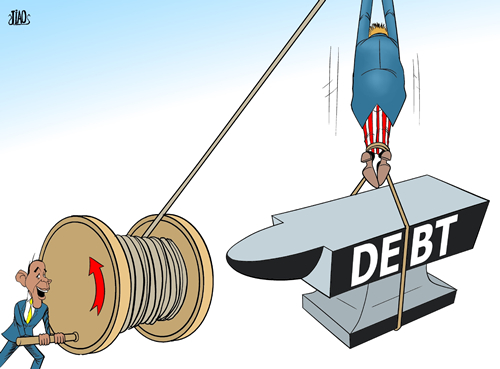Obama and GOP play chicken over U.S. debt
- By Alexandre Lesto
 0 Comment(s)
0 Comment(s) Print
Print E-mail
China.org.cn, July 6, 2011
E-mail
China.org.cn, July 6, 2011
|
|
|
[By Jiao Haiyang/China.org.cn] |
Amid tomatoes hurled by partisan cable networks, expletives uttered by Republicans trying to pick a candidate for 2012 and explicit photos tweeted by Democratic congressmen, it can be easy to get detracted from the important issues in the United States.
The ongoing debate over the debt ceiling is a case in point. Granted, it doesn't share the same pizzazz and excitement as the daily drama we call American politics. Still, the policy holds the power to affect our lives much more profoundly than, say, salacious pictures of our legislators.
With the recent economic crisis and war in the Middle East still raging, the United States has seen its federal spending rise to 25 percent of the country's gross domestic product, nearly breaking through the $14 trillion debt ceiling, the money the government is legally entitled to borrow. Unless the debt ceiling is raised, the United States could, for the first time in its history, be forced to delay payments to its creditors – defaulting on its debt.
The timeframe for raising the debt limit is Aug. 2. At the center of the debate is a tug-of-war between Obama, who wants to raise the ceiling, and Republicans in Congress, who hope to hold the budget hostage in hopes of winning a number of concessions. The GOP want to pass major spending cuts for 2012, create $2 trillion of savings over the coming decade, place spending caps on Washington at 18 percent of gross domestic product and adopt a balanced budget amendment to the Constitution. Obviously, the White House doesn't want to see its spending power curbed without putting up a fight.
With less than a month left on the clock, what would happen if the parties failed to reach an agreement and the debt ceiling was not raised?
A host of things. The government would be forced to pick favorites among its social programs and pull the financial plug on others. Market insecurity would lead to higher interest rates and increased borrowing costs. Finally, in the face of delays on interest payments, the value of the dollar would end up declining.






